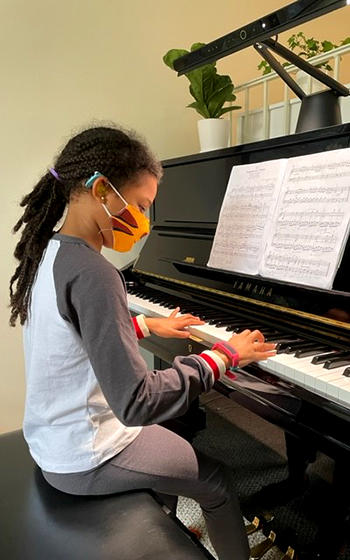
The profound benefits of music for deaf children, an impactful research
Drawing on health sciences, social sciences, engineering and medicine, institute research covers many topics, including making music more accessible for people with disabilities and the benefits of music for individuals with mental health issues and for older adults.
One key institute project is titled “The effect of piano lessons on deaf children with cochlear implants.” The people behind it are Professor Gilles Comeau, Institute founder and director, and master’s student Sandra Markovic.
Children aged four to nine received six months of individual piano lessons, using Suzuki-based aural modelling and multi-sensory (tactile, auditory, verbal and visual) teaching.
At the end of the six months, a group with normal hearing and a group of pre-lingual cochlear implant recipients (deaf infants who received an implant before the age of two) were compared. The level of engagement and enjoyment of the children with cochlear implants was slightly higher. All children participating in the experiment performed in a student recital.
Confidence and a lasting interest in music
The piano lessons have shown that children who are deaf greatly benefit from adaptive musical training. As the mother of one participant says, “Sandra’s teaching ability put my shy, anxious daughter Zoé at ease. It has increased Zoé’s playing proficiency to a remarkable level.” The mother adds, “But … it has also bolstered her confidence to perform in areas beyond the musical realm. And she has become quite the little athlete … and has an active social life.”
Two eight-year-old twin boys also participated in the initial research, one with moderate to severe hearing loss and the other with no hearing impairment. For their mother, Alyson Di Franco, “the study did show a positive connection between learning music and speech/language development. We were […] grateful for the piano lessons, which sparked a lifelong interest in music.” The boys continued to play piano afterwards and went on to teach themselves guitar, bass, drums and saxophone, creating a band with friends and writing and recording their own songs.

Cochlear implants and a violinist who “feels” the music
Cochlear implant (CI) users experience multiple hearing limitations that pose challenges for perceiving and playing music. However, Comeau and graduate student Raina Saunders, in collaboration with Dr. Ryan Rourke and colleagues at CHEO, conducted a case study on an 18-year-old pediatric CI recipient diagnosed with severe to profound bilateral congenita hearing loss at two months of age.
Alexandre, a music student at uOttawa, has an exceptional capacity to perceive music and play the violin, a pitch-sensitive instrument. He relies on internal hearing and vibration perception. “Hearing inside (makes it) nearly impossible to miss the notes,” he says. Alexandre adds, “I love how the (violin) is on your cheeks and on your fingers.”
This case provides a remarkable example of the potential for some children with CI to achieve a high level of musical performance.
Hopes for a lab at CHEO
The institute has also developed solid partnerships with all National Capital Region hospitals (including CHEO) and key researchers in relevant fields.
CHEO has been practicing cochlear implant surgery in prelingual children for 20 years. Parents want to see their children experience all that life can offer to them, and now, music is a possibility.
Looking forward, Comeau hopes that “one day, the MHRI will have a lab at CHEO where music training is implemented in tandem with auditory verbal therapy after children receive the cochlear implant surgery.”
Sounds like a note to close on.
